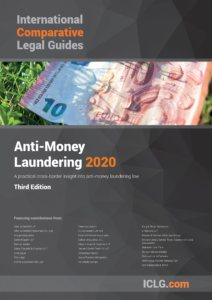 The Financial Crimes Enforcement Network (“FinCEN”) recently complied with two important deadlines under the Anti-Money Laundering Act (“AML Act”) — issuing national priorities for AML and countering the financing of terrorism (“CFT”), and issuing an assessment on potential “no-action” letters. Both of these publications were due on June 30, 2021. This development prompted us
The Financial Crimes Enforcement Network (“FinCEN”) recently complied with two important deadlines under the Anti-Money Laundering Act (“AML Act”) — issuing national priorities for AML and countering the financing of terrorism (“CFT”), and issuing an assessment on potential “no-action” letters. Both of these publications were due on June 30, 2021. This development prompted us
Mary K. Treanor
treanorm@ballardspahr.com | 215.864.8131 | view full bio
Mary focuses her practice on white collar matters and complex commercial litigation. She advises clients on BSA and AML matters, including government and internal investigations. She also counsels financial institutions on SAR filings and confidentiality requirements. Prior to joining Ballard Spahr, Mary worked for a Washington, D.C. law firm, representing clients in market manipulation and failure to supervise enforcement actions brought by the CFTC and FERC. She also advised financial institutions on compliance with the Dodd-Frank Act and corresponding agency regulations.
Ballard Spahr Offers Webinar on PPP Fraud and BSA/AML Issues
 Lending through the Paycheck Protection Program (“PPP”) ended on May 31, 2021. In just over a year, nearly 5,500 lenders made almost 12 million loans totaling $8 billion through two rounds of PPP lending. While lenders pivot to the forgiveness process of the PPP, Congress, regulators and enforcement agencies have been actively investigating the extent…
Lending through the Paycheck Protection Program (“PPP”) ended on May 31, 2021. In just over a year, nearly 5,500 lenders made almost 12 million loans totaling $8 billion through two rounds of PPP lending. While lenders pivot to the forgiveness process of the PPP, Congress, regulators and enforcement agencies have been actively investigating the extent…
DOJ Charges Armored Car Service CEO for Elaborate Scheme to Launder Money Through Illegal Gold
 On June 23, 2021, the Department of Justice unsealed a criminal complaint and affidavit filed in the Southern District of Florida that alleges a vast scheme to launder money through illegal gold mining. The DOJ charged Jesus Gabriel Rodriguez, Jr., the CEO and President of Transvalue, Inc., a South Florida-based armored car service, with one count of conspiring to commit money laundering. The affidavit attached to the complaint alleges that Rodriguez conspired with employees of a South Florida-based gold refining company to import thousands of kilograms of illicitly-sourced gold from Curacao worth millions of dollars, and then use his company’s fleet of armored trucks to thwart the anti-money laundering (“AML”) program of a U.S. precious metals refinery receiving the gold.
On June 23, 2021, the Department of Justice unsealed a criminal complaint and affidavit filed in the Southern District of Florida that alleges a vast scheme to launder money through illegal gold mining. The DOJ charged Jesus Gabriel Rodriguez, Jr., the CEO and President of Transvalue, Inc., a South Florida-based armored car service, with one count of conspiring to commit money laundering. The affidavit attached to the complaint alleges that Rodriguez conspired with employees of a South Florida-based gold refining company to import thousands of kilograms of illicitly-sourced gold from Curacao worth millions of dollars, and then use his company’s fleet of armored trucks to thwart the anti-money laundering (“AML”) program of a U.S. precious metals refinery receiving the gold.
As we have blogged, gold is an especially effective medium for money laundering because it has universal and readily ascertainable value and is difficult to trace. Curacao, a Caribbean island with no gold mines, is commonly part of the route for gold illegally mined in, and smuggled out of, South America (including Venezuela) and Africa.
Continue Reading DOJ Charges Armored Car Service CEO for Elaborate Scheme to Launder Money Through Illegal Gold
FinCEN Again Extends GTO Regarding Real Estate and Money Laundering
 Meanwhile, Congress Wants a Report on Russian Money Laundering and Its Relationship to the Real Estate Industry
Meanwhile, Congress Wants a Report on Russian Money Laundering and Its Relationship to the Real Estate Industry
FinCEN announced today that, once again, it is extending the Geographic Targeting Order, or GTO, regarding real estate transactions.
FinCEN’s press release is here. The new GTO is here. It is identical to the most recently…
“Real Housewives” Star Indicted for Money Laundering and Fraud
 The U.S. Attorney’s Office for the Southern District of New York announced the unsealing of a superseding indictment charging Jennifer Shah and another person for conspiring to commit wire fraud and money laundering. Shah, described in promotional materials as having an “extravagant personality and sharp tongue,” is a star on the reality television series The…
The U.S. Attorney’s Office for the Southern District of New York announced the unsealing of a superseding indictment charging Jennifer Shah and another person for conspiring to commit wire fraud and money laundering. Shah, described in promotional materials as having an “extravagant personality and sharp tongue,” is a star on the reality television series The…
FinCEN and Other Federal Banking Agencies Provide Much-Needed Guidance on Suspicious Activity Reports
 SARs Do Not Need to Be Filed At the First Sign of Potential Problems
SARs Do Not Need to Be Filed At the First Sign of Potential Problems
Honoring “Keep Open” Letters from Law Enforcement Should Not Lead to Criticism
On January 19, 2021, the Financial Crimes Enforcement Network (FinCEN), along with the Office of the Comptroller of the Currency, the Federal Deposit Insurance Corporation, the Board of Governors of the Federal Reserve System, and the National Credit Union Administration jointly published Answers to Frequently Asked Questions Regarding Suspicious Activity Reporting and Other Anti-Money Laundering Considerations. The agencies provided answers to certain frequently asked questions (FAQs) in an effort to (1) clarify for financial institutions the regulatory requirements related to Suspicious Activity Reports (SARs) that they must comply with; and (2) help financial institutions focus their resources on Bank Secrecy Act (BSA) reporting activities that provide the most value to law enforcement.
The banking agencies developed these FAQs in response to recommendations made by the Bank Secrecy Act Advisory Group, which are detailed in FinCEN’s Advance Notice of Proposed Rulemaking on Anti-Money Laundering Program Effectiveness published in September 2020. Notably, the FAQs do not change existing legal obligations or create new regulatory requirements. Instead, they address several questions that have emerged among anti-money laundering compliance personnel. Generally, they are helpful and make clear that a decision to file a SAR in a particular case is driven by specific circumstances and good judgment, rather than a rigid “check the box” mentality.
Continue Reading FinCEN and Other Federal Banking Agencies Provide Much-Needed Guidance on Suspicious Activity Reports
Money Laundering Watch: 2020 Year in Review
 Farewell to 2020. Although it was an extremely difficult year, let’s still look back — because 2020 was yet another busy year in the world of money laundering and BSA/AML compliance.
Farewell to 2020. Although it was an extremely difficult year, let’s still look back — because 2020 was yet another busy year in the world of money laundering and BSA/AML compliance.
We are highlighting 12 of our most-read blog posts from 2020, which address many of the key issues we’ve examined during the past year…
Wirecard: A Scandal
“Germany’s Enron” Continues to Stagger Forward
It’s time to talk about Wirecard AG. In many respects, it’s yet another accounting fraud scandal – albeit a massive one. But now, inevitably, it also has become a money laundering scandal, courtesy of German law enforcement authorities – and also now U.S. authorities – which are looking into the alleged misuse of shell companies to facilitate the pursuit of pornography, gambling and marijuana distribution. And it’s a story that clearly will be with us for some time, like the Danske Bank disaster. We surely will be blogging on this scandal going forward.
The fallout from the massive, years-long accounting scandal involving Wirecard, the German-based fintech giant, recently has blossomed to implicate alleged money laundering failures by the company and even systemic failures on the part of German regulatory authorities. Wirecard, a payment processor publicly valued more than some of the world’s largest banks, has been in a free-fall since a bombshell report by the Financial Times (“FT”) on February 7, 2019 revealed Wirecard’s widespread accounting fraud after being tipped off by a whistleblower.
As with the Dankse Bank scandal, a whistleblower allegedly was instrumental in causing the financial house of cards to collapse. This is also a story of investigative journalism and its consequences. Please check out this YouTube video by a FT reporter describing the efforts by himself and his colleagues to investigate Wirecard, and what he believed occurred as a result.
This June, Wirecard filed for insolvency and disclosed that it owed creditors almost $4 billion and that 1.9 billion euros – two-thirds of the company’s 2019 revenue – was missing from its accounts. In an effort to calm investors, Wirecard announced earlier this month that James Freis – previously the director of the Financial Crimes Enforcement Network (“FinCEN”) – would serve as the new CEO just after German authorities arrested Wirecard’s longstanding CEO, Markus Braun, for his alleged role in the scandal. Wirecard initially hired Fries as a Compliance Officer but, in a shocking turn of events, appointed him as interim CEO the very next day.
Despite these efforts, Wirecard’s legal troubles continue to grow and new reports emerged last week implicating the company in various money laundering schemes entirely unrelated to the accounting fraud. In an even stranger twist: with the details of both scandals emerging, the spotlight has turned to the alleged inaction of Germany’s regulatory authorities – putting aside the issue of Wirecard’s own auditors – and how they can and should prevent future scandals.
Continue Reading Wirecard: A Scandal
FinCEN Director Blanco Urges Collaboration Across Virtual Currency Industry to Comply with Travel Rule

Kenneth Blanco, Director of the Financial Crimes Enforcement Network (“FinCEN”), recently provided remarks about FinCEN’s “Travel Rule” at the first truly-virtual Consensus Blockchain Conference. The Travel Rule, which became effective in 1996, requires money services businesses (“MSBs”) – including cryptocurrency exchanges – to maintain identifying information on all parties in fund transfers of over $3,000 between financial institutions. As we discuss below, this principle creates real-world practical problems in the digital currency industry, in which it is not necessarily easy to obtain such information, unlike the traditional banking industry.
During his remarks, Director Blanco applauded the Financial Action Task Force’s (“FATF”) guidance issued last June, about which we have blogged here, instructing its 180 international member governments to similarly demand that virtual asset service providers (“VASPs”) collect “accurate originator information and required beneficiary information” on transactions of $1,000 or more. FATF’s pronouncement sent some shockwaves through the digital currency industry.
Notably, Director Blanco also lauded the efforts of cross-sector organizations and working groups to develop international standards and solutions to aid compliance with the Travel Rule. He urged for continued cooperation between FinCEN and the virtual currency industry to effectively implement Anti-Money Laundering (“AML”) measures consistent with the Travel Rule.
Continue Reading FinCEN Director Blanco Urges Collaboration Across Virtual Currency Industry to Comply with Travel Rule
The Intersection of Money Laundering and Real Estate
 We are very pleased to announce that we have published a detailed chapter, The Intersection of Money Laundering and Real Estate, in Anti-Money Laundering Laws and Regulations 2020, a publication issued by International Comparative Legal Guides (ICLG).
We are very pleased to announce that we have published a detailed chapter, The Intersection of Money Laundering and Real Estate, in Anti-Money Laundering Laws and Regulations 2020, a publication issued by International Comparative Legal Guides (ICLG).
Money laundering and anti-money laundering concerns relating to the real estate industry is a topic on which…